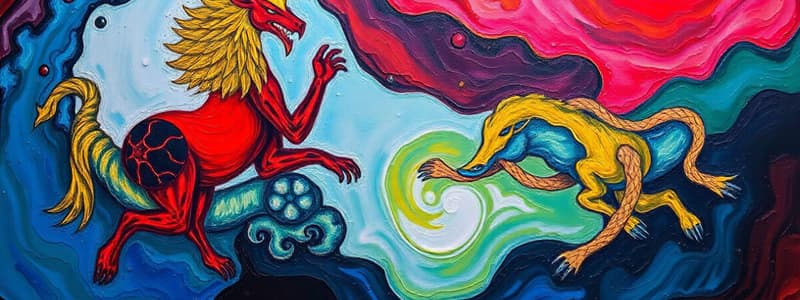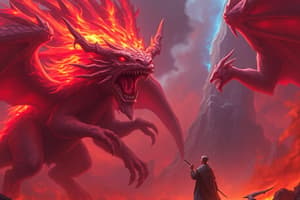Podcast
Questions and Answers
What do creation myths primarily explain?
What do creation myths primarily explain?
- The origins of the universe, earth, and humanity (correct)
- The moral standards of a culture
- The tales of heroes
- The adventures of deities
Hero myths do not typically involve extraordinary individuals with superhuman abilities.
Hero myths do not typically involve extraordinary individuals with superhuman abilities.
False (B)
Name one example of a hero in Greek mythology.
Name one example of a hero in Greek mythology.
Heracles
Myths often illustrate concepts of _________ and ethical standards.
Myths often illustrate concepts of _________ and ethical standards.
Match the following mythologies with their notable features:
Match the following mythologies with their notable features:
Which mythology prominently features the concept of ancestral spirits?
Which mythology prominently features the concept of ancestral spirits?
Chinese mythology frequently depicts mythical beings such as dragons.
Chinese mythology frequently depicts mythical beings such as dragons.
What epic poem is associated with Hindu mythology?
What epic poem is associated with Hindu mythology?
What is one of the explanatory functions of mythology?
What is one of the explanatory functions of mythology?
All mythologies have identical themes and characters.
All mythologies have identical themes and characters.
Name one psychological function that myths serve.
Name one psychological function that myths serve.
Mythology provides a sense of _______ and heritage within cultures.
Mythology provides a sense of _______ and heritage within cultures.
Match the functions of mythology with their descriptions:
Match the functions of mythology with their descriptions:
Which of the following best describes the influence of mythology on modern art?
Which of the following best describes the influence of mythology on modern art?
Myths cannot help people understand human nature.
Myths cannot help people understand human nature.
Mythologies often reflect specific ________, history, and values of the cultures that created them.
Mythologies often reflect specific ________, history, and values of the cultures that created them.
Flashcards
Explanatory Function of Mythology
Explanatory Function of Mythology
Myths explain natural phenomena, human origins, and societal structures.
Social Control in Mythology
Social Control in Mythology
Myths reinforce social norms and values by showing the consequences of breaking them.
Psychological Function of Mythology
Psychological Function of Mythology
Myths address human anxieties and desires, providing a framework for understanding the world and our place in it.
Entertainment Value of Mythology
Entertainment Value of Mythology
Signup and view all the flashcards
Spiritual Significance of Mythology
Spiritual Significance of Mythology
Signup and view all the flashcards
Recurring Motifs in Mythology
Recurring Motifs in Mythology
Signup and view all the flashcards
Cultural Context of Mythology
Cultural Context of Mythology
Signup and view all the flashcards
Diverse Traditions in Mythology
Diverse Traditions in Mythology
Signup and view all the flashcards
World Mythology
World Mythology
Signup and view all the flashcards
Creation Myths
Creation Myths
Signup and view all the flashcards
Hero Myths
Hero Myths
Signup and view all the flashcards
Deities and Gods
Deities and Gods
Signup and view all the flashcards
Ethics and Morality in Mythology
Ethics and Morality in Mythology
Signup and view all the flashcards
Cultural Values in Mythology
Cultural Values in Mythology
Signup and view all the flashcards
Greek Mythology
Greek Mythology
Signup and view all the flashcards
Norse Mythology
Norse Mythology
Signup and view all the flashcards
Study Notes
Introduction to World Mythology
- World mythology encompasses the diverse, often interconnected, stories and beliefs of various cultures globally.
- These stories frequently explain the origins of the world, universe, and humanity.
- They often feature deities, heroes, monsters, and other supernatural beings.
- Mythic narratives typically explore fundamental human concerns like life, death, good versus evil, and societal order.
Key Themes in World Mythology
- Creation Myths: These explain the origin of the universe, earth, and humanity, often involving divine beings or natural forces.
- Hero Myths: Tales of extraordinary individuals performing extraordinary deeds, sometimes with superhuman abilities, facing trials and challenges. They often embody cultural ideals.
- Deities and Gods: Supernatural entities with specific powers and roles within a culture, frequently representing natural phenomena, human emotions, or abstract concepts.
- Ethics and Morality: Myths embody moral and ethical standards, illustrating right and wrong, justice, and consequences of actions.
- Cultural Values and Beliefs: Mythic narratives reflect the values, beliefs, and social structures of a particular culture.
Examples of World Mythology
- Greek Mythology: Centered around Olympian gods, heroes like Heracles, and epic poems like the Odyssey and Iliad.
- Norse Mythology: Features powerful gods like Odin and Thor, mythical creatures like trolls and elves, and tales of the Vikings.
- Egyptian Mythology: Focuses on deities connected to natural forces, cyclical events (like the Nile floods), and the afterlife.
- Mesopotamian Mythology: Includes the creation epic Enuma Elish and stories of gods like Marduk and Ishtar.
- Hindu Mythology: Includes epics like the Ramayana and Mahabharata with complex narratives of gods, goddesses, heroes, and ethical dilemmas.
- Native American Mythology: Diverse creation stories, spirit beings, and cultural traditions unique to individual tribes.
- Chinese Mythology: Often features ancient emperors, powerful dragons, and mythical beings like the Jade Emperor.
- African Mythology: Various cultures have narratives about origins, ancestors, and relationships with nature, often including ancestral spirits.
- Japanese Mythology: Combines Shinto beliefs with Buddhist influences, featuring kami (spirits), mythical creatures (like yokai), and important figures like the emperors.
Functions and Interpretations of Mythology
- Explanatory Function: Myths explain natural phenomena, human origins, and societal structures.
- Social Control: Myths reinforce social norms and values through consequences of breaking them.
- Psychological Function: Myths address human anxieties and desires, providing a framework for understanding the world and our place in it.
- Entertainment: Myth stories offer narratives, entertaining and stimulating imagination about the human condition.
- Spiritual Significance: Myths form the basis for religious beliefs and practices.
Similarities and Differences Across Mythologies
- Recurring Motifs: Many mythologies share recurring motifs like world creation from chaos, struggle between good and evil, journeys to the underworld, and the hero's journey.
- Cultural Context: Mythologies reflect the specific environment, history, and values of the cultures that created them.
- Diverse Traditions: Each mythology offers unique gods, heroes, and stories adapting to specific cultural values and experiences.
Modern Relevance of Mythology
- Cultural Identity: Myths remain central to many cultures, providing a strong sense of cultural identity and heritage.
- Inspiration for Art and Literature: Mythical figures, stories, and themes inspire modern art and literature.
- Understanding Human Nature: Mythological narratives provide insight into human nature and timeless questions.
- Psychological Perspectives: Modern interpretations analyze myths to understand the human psyche and subconscious desires, fears, and motivations.
Studying That Suits You
Use AI to generate personalized quizzes and flashcards to suit your learning preferences.



